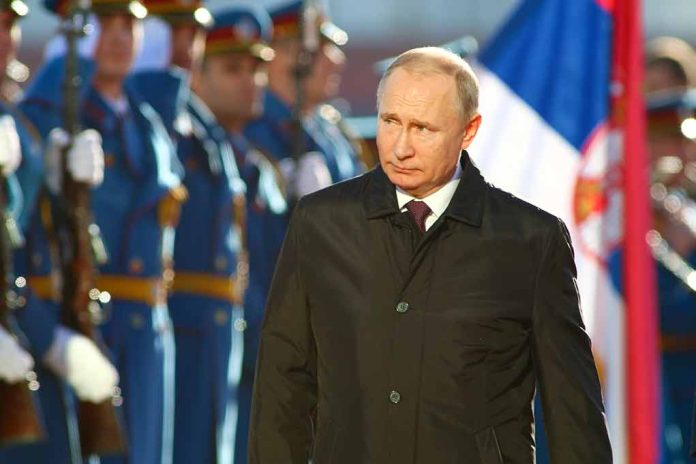
Moscow’s military footprint in Africa has transformed as the Kremlin-directed Africa Corps officially replaces the notorious Wagner Group in Mali, marking a calculated shift in Russia’s strategy to maintain influence while distancing itself from Wagner’s brutal legacy.
Key Takeaways
- The Russian paramilitary Wagner Group has officially withdrawn from Mali, with its operations now under the Moscow-run Africa Corps, directly controlled by Russia’s defense ministry.
- Mali’s ruling junta, which seized power through coups in 2020 and 2021, abandoned its traditional alliance with France in favor of Russian military support.
- Human rights groups have documented extensive abuses during Wagner’s presence, including a UN report accusing Mali’s army and foreign fighters of executing 500 people in March 2022.
- The Africa Corps is expected to focus more on training and equipment rather than direct combat operations, potentially signaling a strategic shift in Russia’s approach.
- Despite Wagner’s departure, the Kremlin maintains firm control over military operations in Mali through the Africa Corps, extending Russia’s geopolitical influence as Western presence continues to decline.
Russia’s Strategic Pivot in Mali
The departure of the Wagner Group from Mali represents a significant shift in Russia’s military engagement in Africa. Following the death of Wagner leader Yevgeny Prigozhin in a plane crash in August 2023, Moscow moved to bring its African military operations under more direct control. The Africa Corps, officially under the Russian defense ministry’s command, has now stepped in to replace Wagner’s forces in Mali, continuing Russia’s mission to expand influence in regions where Western powers are in retreat.
Mali’s ruling military junta, which took power through successive coups in 2020 and 2021, has increasingly pivoted away from traditional Western allies, particularly France, which withdrew its troops in 2022 amid deteriorating relations. This military vacuum created an opportunity for Russia to expand its influence in the mineral-rich region. While the Malian government never officially acknowledged Wagner’s presence, instead referring to their Russian allies simply as “instructors,” the transition to the Africa Corps indicates a more formalized relationship with Moscow.
Wagner’s Controversial Legacy
Wagner’s presence in Mali, which began in late 2021, has been marred by allegations of severe human rights abuses. Human rights groups have documented numerous incidents involving Wagner mercenaries and Malian forces, most notably a UN report that accused them of executing approximately 500 people in March 2022. These brutal tactics have damaged Russia’s reputation in the region while failing to decisively defeat the jihadist threat.
“Since the death of Prigozhin, Russia has had this whole plan to then make the Wagner Group fall under the command of the Ministry of Defense. One of the steps they made was to revamp or introduce the Africa Corps, which is the way in which the Russian paramilitaries would retain a presence in areas where the Wagner group has been operating,” said Beverly Ochieng, a researcher with BBC Monitoring.
Wagner’s withdrawal also coincides with a resurgence of jihadist attacks in Mali and significant losses suffered by Russian mercenaries. A Telegram account affiliated with Wagner announced: “Mission accomplished. PMC Wagner is going home,” suggesting either an attempt to save face after setbacks or a planned transition to the new Africa Corps structure. Analysts note that Wagner’s departure follows heavy casualties inflicted by the al-Qaida-linked group JNIM in recent months.
The Africa Corps: A New Approach
The Africa Corps represents Moscow’s attempt to maintain its influence while establishing a more controlled and potentially less controversial military presence. Unlike Wagner’s focus on direct combat operations, the Africa Corps is expected to prioritize training Malian forces and providing equipment. This shift may reflect lessons learned from Wagner’s high-casualty approach and the international criticism it attracted.
“The lack of an official and mutual announcement from both the Malian authorities and Wagner indicate possible internal dispute which led to this sudden decision. Simultaneously, this could point to a new framework for Russian presence in the country,” said Rida Lyammouri, a senior fellow at the Policy Center for the New South.
Currently, approximately 2,000 Russian mercenaries operate in Mali, though the exact division between remaining Wagner personnel and new Africa Corps fighters remains unclear. The Russian defense ministry has been negotiating with Mali to integrate more Africa Corps fighters and transition former Wagner mercenaries to the state-controlled force, creating a more unified command structure under Kremlin oversight.
Kremlin Control Remains Constant
Despite the change in name and structure, the fundamental reality of Russian control remains unchanged. The Kremlin continues to direct military operations in Mali, using the Africa Corps as its new instrument for projecting power in the region. This continuity underscores Russia’s commitment to maintaining its foothold in Africa regardless of which specific organization implements its policy.
“Wagner yesterday or Africa Corps today, our point of contact remains the same, it is the central power in Russia, that is to say the Kremlin,” confirmed a Malian security source, highlighting the unchanged power dynamics, according to the Wagner Group.
As Mali and neighboring countries Burkina Faso and Niger continue to battle insurgencies linked to al-Qaida and the Islamic State, Russia’s military engagement through the Africa Corps represents an evolving approach to extending influence in regions where Western powers have retreated. The transition from Wagner to the Africa Corps may improve Russia’s image internationally while preserving its strategic presence in the mineral-rich Sahel region, allowing President Trump’s global counterparts to maintain their geopolitical ambitions with fewer international complications.



